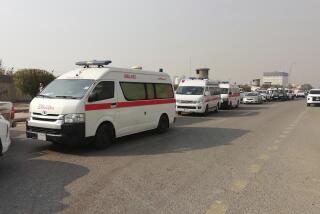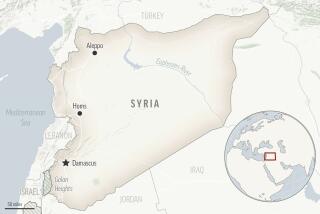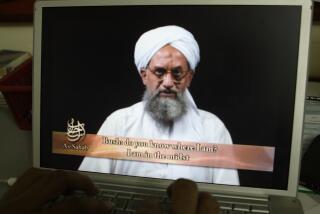U.S. believes strike in Pakistan killed key terrorist
- Share via
WASHINGTON — An Al Qaeda figure killed in a U.S. airstrike in Pakistan last week is believed to have been an Algerian allegedly involved in training militants and plotting attacks against the West, officials said Friday.
The Algerian, known by the nickname Abu Sulayman Jazairi, apparently died May 14 in the strike that killed as many as 14 people and destroyed a compound near the village of Damadola, an Al Qaeda stronghold in northwestern Pakistan, officials said. A knowledgeable U.S. official and a senior European anti-terrorism official said Jazairi was thought to be dead.
U.S. anti-terrorism forces are targeting front-line planners in Pakistani hide-outs, and Jazairi would be another in a series of recent losses for the Al Qaeda leadership, the two officials said.
“He was a significant person within the Al Qaeda ranks,” said the senior European official, who requested anonymity because of the sensitivity of the topic. “Not in the top five, but he’s up there. The suspicion is he was one of those individuals involved in training and targeting Western interests. There is uncorroborated intelligence that he was involved in plots against Europe.”
Officials declined to discuss last week’s operation because of political tension in Pakistan over U.S. airstrikes. The strength of Al Qaeda and the Taliban movement in the lawless tribal areas makes it difficult to independently confirm information there.
In fact, some doubt lingers about the identity of the man killed. This week, a senior Pakistani intelligence official said he believed the slain man was not the Algerian but another foreign militant. Despite the confusion, the U.S. and European officials said their information about the militant’s identity seemed solid.
“There are good reasons to think that Al Jazairi is dead,” said the U.S. official, who spoke on condition of anonymity because he was not authorized to discuss the matter publicly. The European official said there recently had been allusions to Jazairi’s death on radical websites.
Jazairi was an explosives expert and “important terrorist trainer,” the U.S. official said.
“When it comes to training, this individual was an important figure,” the official said. “People like him are vital to terrorist plots. That doesn’t mean he can’t be replaced. But when Al Qaeda loses someone with his experience, it matters.”
Al Qaeda leader Osama bin Laden and his deputy, Ayman Zawahiri, have eluded pursuers. An airstrike on Damadola in 2006 is thought to have narrowly missed Zawahiri.
But a systematic assault on operational bosses seems to be paying off, officials said. A Libyan chief died in January during one of a flurry of airstrikes in Pakistan this year.
Abu Ubaida al Masri, the network’s external operations chief, died of an infectious disease about the same time. His Iraqi predecessor was captured in late 2006.
Jazairi surfaced in Pakistan about six years ago and was a mid-level figure who gained stature as other plotters and trainers fell, officials said.
The European official said, “He was someone you could imagine as a potential successor to Masri.”
Although many Al Qaeda fighters are Algerian, few Algerians have been detected in the core leadership in Pakistan or Afghanistan. They have been active mostly in North Africa, Europe and Iraq. And the Al Qaeda leadership has been wary because of fears that Algerian extremist movements are infiltrated by Algerian spies.
The increasing success and pace of airstrikes this year indicates that American spy agencies and their allies have made progress in infiltrating Al Qaeda in Pakistan, said Louis Caprioli, a former anti-terrorism chief of France’s DST intelligence agency.
“You have to have good intelligence on the ground to hit a target like that,” Caprioli said. “It requires human as well as technical intelligence. I think the money that the Americans are spreading around is having an effect.
“Also, there are troops in Afghanistan, prisoners being interrogated. This is a long-term effort that is paying off.”
--
--
josh.meyer@latimes.com
--
Meyer reported from Washington and Rotella from Madrid. Times staff writer Laura King in Islamabad, Pakistan, contributed to this report.
More to Read
Sign up for Essential California
The most important California stories and recommendations in your inbox every morning.
You may occasionally receive promotional content from the Los Angeles Times.












